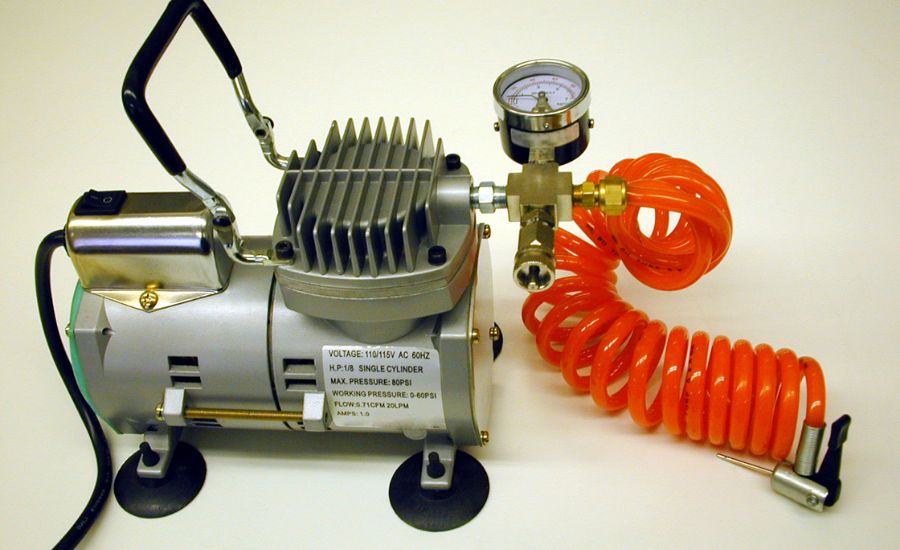The utilization of air compressors is extensive across numerous sectors ranging from manufacturing to construction, constituting an indispensable component of various processes. To optimize productivity and economize energy costs, the efficiency of air compressors is of paramount importance.
This article aims to explore the different determinants that affect the efficiency of an air compressor and the methods to increase it.

Contents
What is air compressor efficiency?
An air compressor is a mechanical device that compresses atmospheric air to increase its pressure and stores it in a tank or a distribution system for use in various applications.
It consists of a compression system, an electric motor or engine, and other equipment such as filters, dryers, and regulators.
Energy efficiency is a crucial factor of air compressor effectiveness because compression systems are notorious for consuming large amounts of energy.
Therefore, manufacturers focus on designing efficient air compressors that reduce power consumption while providing reliable and consistent compression of air.
Efficient compressors employ several design features and technologies to enhance energy efficiency, including variable speed drives, efficient motors, and advanced controls.
The efficiency of an air compressor is determined by its ability to compress the air by using electricity with minimum losses.
A more efficient air compressor requires less energy to generate the same amount of compressed air and lowers the energy bills and higher overall efficiency.

Factors that affect air compressor’s efficiency
Air intake quality
The efficiency of the compressor is influenced by the quality of the air intake.
If the air is contaminated or dusty, it can result in harm to the air compressor, which can lead to reduced efficiency and increased maintenance expenses.
Compressor type
There are varying efficiencies among compressors of different types. Rotary screw compressors outperform reciprocating compressors due to their ability to run continuously, leading to fewer instances of pressure declines and lower energy consumption.
Pressure
The effectiveness of the air compressor also depends on the level of pressure at which it is working.
For instance, it consumes more energy while the pressure is high, which leads to increased money expenditures for that energy and decreases the general efficiency.
Pressure drop
A pressure drop is a reduction in pressure that occurs as compressed air flows through the system.
Higher pressure drops lead to decreased efficiency and increased costs of energy.
Heat recovery system
A system of heat recovery increases the effectiveness of the air compressor by capturing the excess heat that was emitted during compression and repurposing it for other processes, like heating the water.

Ways to improve air compressor’s efficiency
Choose the air compressor carefully
Be highly careful while choosing an air compressor, since they have significant differences between them, to buy the most efficient air compressor.
Maintain air intake quality
Regularly clean and maintain the air intake to ensure that the compressor is receiving clean and uncontaminated air.
Use oil-free air compressors
Using oil-free air compressors will help you to increase the overall effectiveness and lower the cost of maintenance since you will not need to change the oil.
Reduce pressure drops
Use larger air compressors or install additional equipment to reduce pressure declines in the system, resulting in increased effectiveness and lower energy expenses.
Monitor air pressure
Monitor the pressure of the air regularly and adjust the air compressor settings accordingly to avoid overloading the system and wasting energy.
Implement heat recovery systems
Install a system of heat recovery to capture the heat generated during compression and use it for other processes, resulting in increased efficiency and cost savings.

Conclusion
To conclude, the main meaning of air compressor efficiency is high productivity and low consumption of energy, which will help you to save money. This can be done while achieving the same task if we know what makes difference in the efficiency of this tool and the methods that may increase it.
To make sure that your air compressor system operates efficiently, you have to pay attention to the type of air compressor, monitor the pressure, maintain air intake, and decrease the declinings of pressure.
By doing so, saving money on your bills for energy and improving your overall efficiency will be easier.
Frequently asked questions
What is the most efficient air compression?
The most efficient compression method is using a rotary screw compressor. They are designed to provide a continuous pressed air supply and can operate at high speeds, resulting in greater output. Additionally, their energy consumption is than other types of air compressors, and have a longer lifespan.
Why are air compressors inefficient?
Firstly, they may use outdated technology or have poor maintenance, leading to leakage, which can result in wasted energy.Secondly, if the air compressor is oversized or undersized, it can also affect its efficiency. Lastly, operating compressors at low pressures can be a source of inefficiency as they may run continuously, resulting in energy waste.
Is compressed air energy-efficient?
Compressed air is not always energy-efficient, as it depends on various factors. For instance, inefficient compressors that are not appropriately sized or regularly maintained may consume more energy than necessary.However, with proper installation and maintenance, pressed air can be energy-efficient as it is a versatile and convenient source of energy that can be used in various industrial applications.
Read More: Energy Efficiency in Air Compressors


